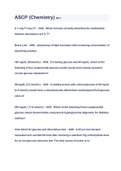Ascp mlt chemistry - Study guides, Class notes & Summaries
Looking for the best study guides, study notes and summaries about Ascp mlt chemistry? On this page you'll find 93 study documents about Ascp mlt chemistry.
Page 4 out of 93 results
Sort by
ASCP (Chemistry) MLT. QUESTIONS & ANSWERS 2023( A+ GRADED 100% VERIFIED)
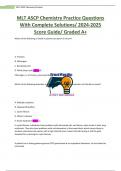
-
MLT ASCP Chemistry Practice Questions With Complete Solutions/ 2024-2025 Score Guide/ Graded A+
- Exam (elaborations) • 23 pages • 2024
-
Available in package deal
-
- $11.50
- + learn more
MLT ASCP Chemistry Practice Questions With Complete Solutions/ Score Guide/ Graded A+ Which of the following is found in plasma but absent in serum? A. Proteins B. Fibrinogen C. Red blood cells D. White blood cells [Ans: - B; Fibrinogen, is, of course, consumed during the clotting process. Which of the following disorders is characterized by increased production of chloride in sweat? A. Multiple myeloma B. Hypoparathyoidism C. Cystic fibrosis D. Wilson's disease E. Do...
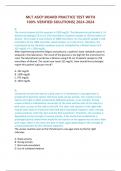
-
MLT ASCP BOARD PRACTICE TEST WITH 100% VERIFIED SOLUTIONS| 2024-2024
- Exam (elaborations) • 35 pages • 2024
-
- $12.99
- + learn more
MLT ASCP BOARD PRACTICE TEST WITH 100% VERIFIED SOLUTIONS| B; The correct answer for this question is 1300 mg/dL. The laboratorian performed a 1:4 dilution by adding 0.25 mL (or 250 microliters) of patient sample to 750 microliters of diluent. This creates a total volume of 1000 microliters. So, the patient sample is 250 microliters of the 1000 microliter mixed sample, or a ratio of 1:4. Therefore, the result given by the chemistry analyzer must be multiplied by a dilution factor of 4. 325 m...
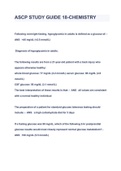
-
ASCP STUDY GUIDE 18-CHEMISTRY questions & answers 2023 ( A+ GRADED 100% VERIFIED)
- Exam (elaborations) • 39 pages • 2023
-
Available in package deal
-
- $9.99
- + learn more
ASCP STUDY GUIDE 18-CHEMISTRY questions & answers 2023 ( A+ GRADED 100% VERIFIED) ASCP questions for the Naval MLT program 1-25 Carbohydrates 26-45 Acid-Base Balance 46-71 Electrolytes 72-127 Proteins and Other Nitrogen-Containing Compounds 128-154 Heme Derivatives
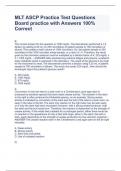
-
MLT ASCP Practice Test Questions Board practice with Answers 100% Correct
- Exam (elaborations) • 30 pages • 2023
-
Available in package deal
-
- $12.99
- + learn more
MLT ASCP Practice Test Questions Board practice with Answers 100% Correct MLT ASCP Practice Test Questions Board practice with Answers 100% Correct MLT ASCP Practice Test Questions Board practice with Answers 100% Correct B; The correct answer for this question is 1300 mg/dL. The laboratorian performed a 1:4 dilution by adding 0.25 mL (or 250 microliters) of patient sample to 750 microliters of diluent. This creates a total volume of 1000 microliters. So, the patient sample is 250 microl...

-
MLT ASCP Chemistry Practice Questions & Answers, rated A+| LATEST UPDATE | EXAM PREDICTION QUESTIONS |
- Exam (elaborations) • 25 pages • 2024
-
Available in package deal
-
- $11.49
- + learn more
MLT ASCP Chemistry Practice Questions & Answers, rated A+ Which one of the following statements about acetaminophen metabolism is false? Choose the single best answer A. It is metabolized in the kidney B. It is largely metabolized in the liver to glucuronide and sulfonate conjugates C. A small amount is metabolized via cytochrome oxidase to a reactive benzoquinoneimine intermediate D. This intermediate becomes toxic to the liver once tissue glutathione becomes depleted - -A; The benzoqu...
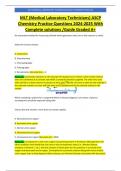
-
MLT (Medical Laboratory Technicians) ASCP Chemistry Practice Questions 2024-2025 With Complete solutions /Guide Graded A+
- Exam (elaborations) • 23 pages • 2024
-
Available in package deal
-
- $12.50
- + learn more
MLT (Medical Laboratory Technicians) ASCP Chemistry Practice Questions With Complete solutions /Guide Graded A+ An automated method for measuring chloride which generates silver ions in the reaction is called: Select the Correct Answer. A. Coulometry B. Potentiometry C. Chromatography D. Polarography E. Densitometry (Accurate Ans: - A; Rationale: Coulometry operates on the principle of Faraday's law in which a silver anode releases silver ions (titration) at a constant rate when a ...
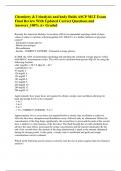
-
Chemistry & Urinalysis and body fluids ASCP MLT Exam Final Review With Updated Correct Questions and Answers_100% A+ Graded
- Exam (elaborations) • 124 pages • 2024
-
Available in package deal
-
- $16.04
- + learn more
Chemistry & Urinalysis and body fluids ASCP MLT Exam Final Review With Updated Correct Questions and Answers_100% A+ Graded Recently the American Diabetes Association (ADA) recommended reporting which of these values in order to correlate with hemoglobin A1C (HbA1C) as a further indicator of glycemic control? - Estimated average glucose - Blood urea nitrogen - Microalbumin - Insulin - CORRECT ANSWER-- Estimated average glucose In 2008, the ADA recommended calculating and reporting the ...
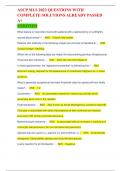
-
MT/MLT/ASCP MLS BUNDLED EXAMS| DOWNLOAD TO SCORE A+
- Package deal • 10 items • 2024
-
- $45.49
- + learn more
AAB MT HEMATOLOGY REVIEW AAB MT MICROBIOLOGY ASCP Study Guide (MLT) MLT ASCP REVIEW 5 MLT LICENSE EXAM ASCP MLS 2023 ASCP MLS STUDY GUIDE: CHEMISTRY ASCP PHLEBOTOMY ASCP recalls (UPDATED) MEDICAL LABORATORY SCIENCE REVIEW- HARR – IMMUNOLOGY
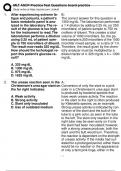
-
MLT ASCP Practice Test Questions board practice Q&A 2024
- Exam (elaborations) • 36 pages • 2024
-
- $7.99
- + learn more
MLT ASCP Practice Test Questions board practice 1. After experiencing extreme fatigue and polyuria, a patient's basic metabolic panel is analyzed in the laboratory. The result of the glucose is too high for the instrument to read. The laboratorian performs a dilution using 0.25 mL of patient sample to 750 microliters of diluent. The result now reads 325 mg/dL. How should the techologist report this patient's glucose result? A. 325 mg/dL B. 1300 mg/dL C. 975 mg/dL D. 1625 mg/dL...

How much did you already spend on Stuvia? Imagine there are plenty more of you out there paying for study notes, but this time YOU are the seller. Ka-ching! Discover all about earning on Stuvia

